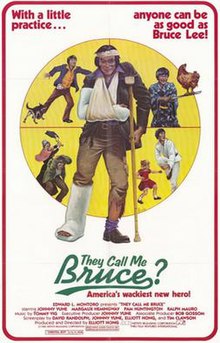
Blow is a 2001 American biographical crime drama film directed by Ted Demme, about an American cocaine kingpin and his international network. David McKenna and Nick Cassavetes adapted Bruce Porter's 1993 book Blow: How a Small Town Boy Made $100 Million with the Medellín Cocaine Cartel and Lost It All for the screenplay. It is based on the real-life stories of U.S. drug trafficker George Jung and his connections including narcotics kings Pablo Escobar and Carlos Lehder Rivas, and the Medellín Cartel.

Rumble in the Bronx is a 1995 Hong Kong martial arts comedy film starring Jackie Chan, Anita Mui and Françoise Yip. It was directed by Stanley Tong, with action choreographed by Chan and Tong. Released in Hong Kong in 1995, Rumble in the Bronx had a successful worldwide theatrical run, and brought Chan into the North American mainstream. The film is set in the Bronx area of New York City, but was filmed in and around Vancouver, Canada.
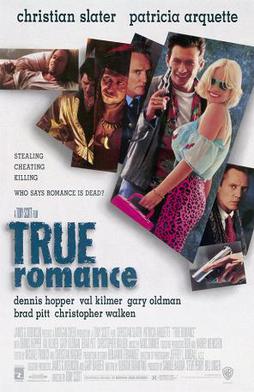
True Romance is a 1993 American romantic crime film directed by Tony Scott and written by Quentin Tarantino. It features an ensemble cast led by Christian Slater and Patricia Arquette, with Dennis Hopper, Val Kilmer, Gary Oldman, Brad Pitt, and Christopher Walken in supporting roles. Slater and Arquette portray newlyweds on the run from the Mafia after stealing a shipment of drugs.

Once Upon a Time in America is a 1984 epic crime film co-written and directed by Italian filmmaker Sergio Leone, and starring Robert De Niro and James Woods. The film is an Italian–American venture produced by The Ladd Company, Embassy International Pictures, PSO Enterprises and Rafran Cinematografica, and distributed by Warner Bros. Based on Harry Grey's novel The Hoods, it chronicles the lives of best friends David "Noodles" Aaronson and Maximilian "Max" Bercovicz as they lead a group of Jewish ghetto youths who rise to prominence as Jewish gangsters in New York City's world of organized crime. The film explores themes of childhood friendships, love, lust, greed, betrayal, loss, and broken relationships, together with the rise of mobsters in American society.
Kung Fu is an American action-adventure martial arts Western drama television series starring David Carradine. The series follows the adventures of Kwai Chang Caine, a Shaolin monk who travels through the American Old West, armed only with his spiritual training and his skill in martial arts, as he seeks Danny Caine, his half-brother.

David Carradine was an American actor, director, and producer, whose career included over 200 major and minor roles in film, television and on stage, spanning more than six decades. He was widely known to television audiences as the star of the 1970s television series Kung Fu, playing Kwai Chang Caine, a peace-loving Shaolin monk traveling through the American Old West.

Dragon: The Bruce Lee Story is a 1993 American biographical drama film directed by Rob Cohen. The film stars Jason Scott Lee, with a supporting cast including Lauren Holly, Nancy Kwan and Robert Wagner. The film follows the life of actor and martial artist Bruce Lee (Jason) from his relocation to the United States from Hong Kong to his career as a martial arts teacher, and then as a television and film actor. It also focuses on the relationship between Bruce and his wife Linda Lee Cadwell, and the racism to which Bruce was subjected.
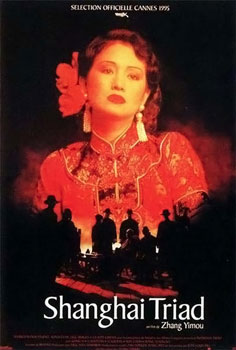
Shanghai Triad is a 1995 Chinese crime-drama film, directed by Zhang Yimou and starring Gong Li. The script is written by Bi Feiyu based on Li Xiao's 1994 novel Rules of a Clan (门规). The film is set in the criminal underworld of 1930s Shanghai, Republic of China and spans seven days. Shanghai Triad's Chinese title reads "Row, row, row to Grandma Bridge", refers to a well known traditional Chinese lullaby.

Kung-Fu Master, known as Spartan X in Japan, is a side-scrolling beat 'em up developed by Irem as an arcade video game in 1984, and distributed by Data East in North America. Designed by Takashi Nishiyama, the game was based on Hong Kong martial arts films. It is a loose adaptation of the Jackie Chan, Sammo Hung, and Yuen Biao film Wheels on Meals (1984), called Spartan X in Japan, with the protagonist Thomas named after Jackie Chan's character in the film. The game is also heavily inspired by the Bruce Lee film Game of Death (1972), which was the basis for the game's concept. Nishiyama, who had previously designed the side-scrolling shooter Moon Patrol (1982), combined fighting elements with a shoot 'em up gameplay rhythm. Irem and Data East exported the game to the West without the Spartan X license.
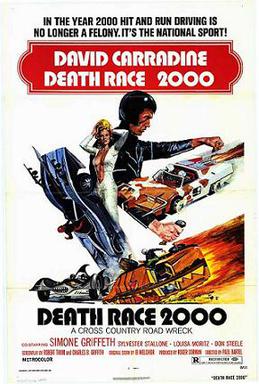
Death Race 2000 is a 1975 American science fiction action film produced by Roger Corman, directed by Paul Bartel, and starring David Carradine. The film takes place in a dystopian American society in the year 2000, where the murderous Transcontinental Road Race has become a form of national entertainment. The screenplay is based on the 1956 short story "The Racer" by Ib Melchior.
The Game of Death is an incomplete Hong Kong martial arts film, of which portions were filmed between September and October 1972, directed, written, produced by and starring Bruce Lee. The project was paused to film and produce Enter the Dragon. For The Game of Death, over 120 minutes of footage was shot, which was later misplaced in the Golden Harvest archives. The remaining footage has since been released with Lee's original Cantonese and English dialogue, with John Little dubbing Lee's Hai Tien character as part of the documentary titled Bruce Lee: A Warrior's Journey. Much of the footage that was shot is from what was to be the climax of the film.

Fist of Fury, also known as The Chinese Connection, is a 1972 Hong Kong action martial arts film directed by Lo Wei and produced by Raymond Chow under Golden Harvest. The film stars Bruce Lee in his major role after The Big Boss (1971). Bruce Lee also worked as the film's action choreographer. In the film, Chen Zhen, a student of Huo Yuanjia, fights to defend the honor of the Chinese in the face of foreign aggression and also exact vengeance responsible for Huo's death.
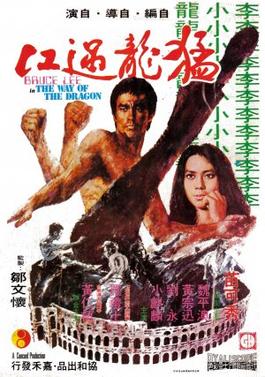
The Way of the Dragon is a 1972 Hong Kong martial arts action comedy film co-produced and directed by Bruce Lee, who also stars in the lead role. This is Lee's only complete directorial film and the last one released during his lifetime. The film co-stars Nora Miao, Robert Wall, Wei Ping-ou and Chuck Norris.

Kung Fu Hustle is a 2004 martial arts action comedy film directed, produced and co-written by Stephen Chow, who also stars in the leading role, alongside Huang Shengyi, Yuen Wah, Yuen Qiu, Danny Chan Kwok-kwan and Leung Siu-lung in prominent roles. The story revolves around a murderous neighbourhood gang, a poor village with unlikely heroes and an aspiring gangster's fierce journey to find his true self. The martial arts choreography is supervised by Yuen Woo-ping.

Wheels on Meals is a 1984 Hong Kong martial arts action comedy film written and directed by Sammo Hung, with action choreographed by Jackie Chan. The film stars Jackie Chan, Sammo Hung, Yuen Biao, Lola Forner, Benny Urquidez and José Sancho. The film was shot in Barcelona, Spain.
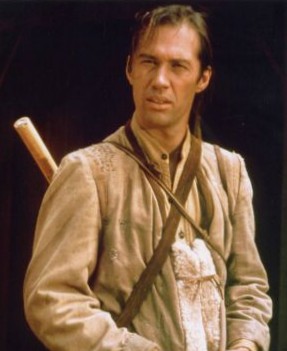
Kwai Chang Caine is a fictional character and the protagonist of the ABC 1972–1975 action-adventure western television series Kung Fu. He has been portrayed by David Carradine as an adult Caine, Keith Carradine as a younger Caine, Radames Pera as the child Caine, and Stephen Manley as the youngest Caine.
Kung fu film is a subgenre of martial arts films and Hong Kong action cinema set in the contemporary period and featuring realistic martial arts. It lacks the fantasy elements seen in wuxia, a related martial arts genre that uses historical settings based on ancient China. Swordplay is also less common in kung-fu films than in wuxia and fighting is done through unarmed combat.

Like Father Like Son is a 1987 American fantasy-comedy film starring Dudley Moore and Kirk Cameron.

Chinatown Kid is a 1977 kung fu film directed by Chang Cheh. Produced by the Shaw Brothers, it stars Alexander Fu Sheng and the Venom Mob. The film deals with drugs, police corruption and gang warfare in San Francisco's Chinatown district.

Birth of the Dragon is a 2016 American martial arts action film directed by George Nolfi and written by Christopher Wilkinson and Stephen J. Rivele. The film stars Philip Wan-lung Ng, Xia Yu, Jin Xing, Qu Jingjing, Ron Yuan, and Billy Magnussen. Based on Michael Dorgan's article "Bruce Lee's Toughest Fight", the film is a fictional account on the supposedly true story revolving around Bruce Lee who, as a young martial artist, challenged kung fu master Wong Jack-man in 1965 in San Francisco.
